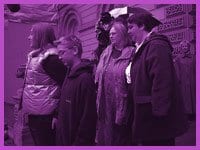With references to Confederation, interracial marriage, the women’s suffrage movement, St Augustine and many, many other court cases, the battle for same-sex marriage hit the Ontario Court Of Appeals last week.
Nine homo couples – seven who were denied marriage licences at Toronto City Hall in 2000 and two whose 2001 church marriages have not been recognized by the government – are asking the court to uphold a July 2002 ruling that says prohibiting same-sex marriage is discriminatory.
The office of the Attorney General Of Canada, which launched this appeal, says that marriage is heterosexual and always has been.
“To say that marriage just is – which is really their whole case – is to beg the question, to never address the question of whether or not our charter requires that same-sex couples’ relationships be recognized and celebrated through marriage recognition,” says lawyer Martha McCarthy.
The ban on same-sex unions is akin to the big civil rights cases of the past, she says, like segregation laws and universal suffrage.
“Not surprisingly, virtually all the opposition to equal marriage has come from people who consider homosexuality to be immoral,” says Laurie Arron, a member of the board of Egale Canada, the national lobby group that gained intervenor status in the case. “They understand that as long as we are excluded from marriage it sends a message, a message from the government that there is something wrong with our relationships and that there is something wrong with being gay, lesbian, bisexual or transgendered.”
“It was a treat to behold so many wonderful advocates intelligently arguing, with restraint and class,” says Joanne Cohen, coordinator of the Coalition Of Canadian Liberal Rabbis, which intervened on behalf of the couples. “I think the court was very impressed by the erudition and the restraint of our side.”
The couples are backed by lawyers and religious groups – and lawyers representing religious groups.
Douglas Elliott, the lawyer for the Metropolitan Community Church Of Toronto, the church that married two of the couples, argued that same-sex marriage is a matter of religious freedom. McCarthy, representing the other seven couples, argued that barriers to same-sex marriage are an insult to the charter and a blight on human rights law.
“The coalition of rabbis is delighted to be among the first mainstream religious intervenors in support of religious and civil same-sex marriage in this case,” says Cohen.
Some religious leaders say they have experienced discrimination first hand. After performing several same-sex marriages, Rabbi Justin Lewis was told by the government that his right to perform marriage ceremonies would be removed if he attempted to register another same-sex union.
“Our congregation, like many others in the reform movement, makes no distinction between people based on their sexual identity,” says Lewis. “The reform movement, part of the main-stream of Judaism, recognizes same-sex marriage.”
Both the religious leaders and the secular groups have argued that this matter shouldn’t even be before the courts, that the government should have long ago shown leadership and legalized same-sex marriages.
In its 2002 ruling, the Ontario Superior Court Of Justice gave Parliament two years to amend the laws. Though the government has a committee looking into it, it’s expected that the case will be appealed right up to the Supreme Court Of Canada. There are cases in Quebec and British Columbia also before the courts in those provinces.

 Why you can trust Xtra
Why you can trust Xtra


